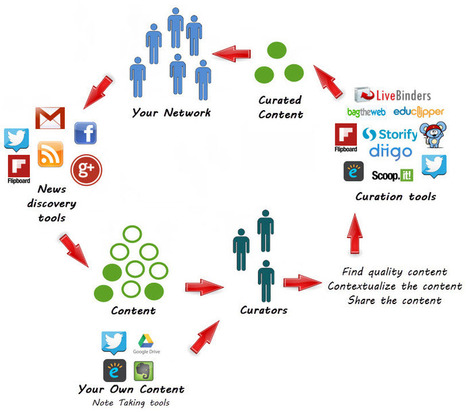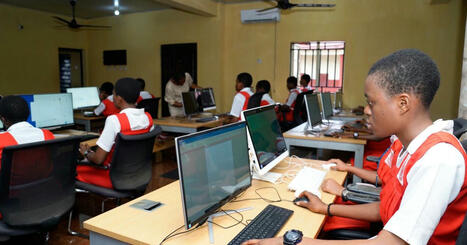 Your new post is loading...
 Your new post is loading...

|
Scooped by
John Gougoulis
April 1, 10:15 PM
|
Australian governments have set the bar too low with the current literacy and numeracy targets facing schools, a bold new report from The Grattan Institute has warned.

|
Scooped by
John Gougoulis
March 29, 11:47 PM
|
Social segregation in Australia’s education system is creating barriers for disadvantaged students and wide systemic change is needed if Australia is to achieve its goal of creating a high equity system that supports all students to reach their full potential.

|
Scooped by
John Gougoulis
March 3, 11:57 PM
|
THE DEMOCRACTIC REPUBLIC OF THE CONGO: In a decisive step toward shaping the future of its youth and bolstering national development, the government of the Republic of Congo has recently unveiled a series of ambitious initiatives designed to strengthen and modernize its education system. These reforms, announced at a high-level conference in Brazzaville las

|
Scooped by
John Gougoulis
February 5, 10:24 PM
|
How do we reform the American education system to ensure that students have access to a breadth of skills? Answer: The science of learning.

|
Scooped by
John Gougoulis
January 29, 9:04 PM
|
Evidence of hybrid work indicates benefits, yet leaders push for a full office return. What will drive future policies?

|
Scooped by
John Gougoulis
January 16, 1:22 AM
|
This story about school leaders was produced by The Hechinger Report, a nonprofit, independent news organization focused on inequality and innovation in education. Sign up for Hechinger’s weekly newsletter. At the start of the school year, I overheard a principal speaking wise words to her students in a school assembly. “Learners are like a box […]

|
Scooped by
John Gougoulis
December 22, 2024 4:24 AM
|
By now, we’re well familiar with critiques of standardized testing opponents: tests rob schools of critical instructional time, encourage teaching to the test, place undue pressure on students and educators to perform, are educationally irrelevant, only provide a snapshot of student achievement at a specific moment in time, and are largely driven by family income levels, parents’ education, and other non-school-related factors.

|
Scooped by
John Gougoulis
December 16, 2024 11:25 PM
|
The education system in the Philippines is floundering. It is time to implement some urgent reforms, such as addressing the spending gap and decentralisation.

|
Scooped by
John Gougoulis
December 7, 2024 3:51 AM
|
International education is undergoing significant changes, influenced by global trends, shifting priorities, and the ever-evolving job market. Students worldwide…

|
Scooped by
John Gougoulis
November 29, 2024 3:07 AM
|
Creating guidelines, room for experimentation and low stakes meetings can help teachers keep up with fast-moving artificial intelligence tools.

|
Scooped by
John Gougoulis
September 25, 2024 5:33 AM
|
In the ever-evolving landscape of education in Kurdistan, the quest for a standardized school year remains a contentious issue, Kurdistan Teachers’ Union (KTU) President Abdulwahed Mohammad Haje explained. The academic calendar, marked by an array of holidays and interruptions, has long been a source of frustration for both educators and students.

|
Scooped by
John Gougoulis
September 10, 2024 7:07 AM
|
Artificial Intelligence (AI) is rapidly transforming our world and changing the way we live, work and learn. To help education systems keep pace, UNESCO is launching two new AI competency frameworks - one for students and one for teachers.

|
Scooped by
John Gougoulis
July 8, 2024 2:33 AM
|
More than 700 educators from across the nation have convened for compelling webinar titled 'The Power of Direct Instruction', presented by founder and director of Good to Great Schools Australia (GGSA), Noel Pearson.
|

|
Scooped by
John Gougoulis
April 1, 9:37 PM
|
Digital learning holds great promise to transform education, but its benefits are not evenly distributed. On the occasion of the International Day for Digital Learning 2025, UNESCO brought together policy-makers, teachers, students and education leaders from around the world to explore how digital learning can foster equity in low-resource contexts.

|
Scooped by
John Gougoulis
March 29, 11:45 PM
|
Almost all companies invest in AI, but just 1% believe they are at maturity. Our new report looks at how AI is being used in the workplace in 2025.

|
Scooped by
John Gougoulis
February 23, 3:13 AM
|
Australian schools desperately need a national standard to stamp out bullying, as confusing labels, off-the-mark definitions and interventions with questionable evidence behind them cloud the scene, one expert has warned.

|
Scooped by
John Gougoulis
January 29, 9:18 PM
|
Starting in March 2025, new AI textbooks will be introduced into Korean schools in mathematics, English, informatics, and Korean for special education, targeting grade 3 and 4 primary school students, as well as students in the first year of lower secondary and upper secondary school.

|
Scooped by
John Gougoulis
January 29, 9:02 PM
|
Engineers are an integral part of our society. Their innovative contributions are essential for enhancing quality of life. In today’s digital era, universities must produce competent engineers equipped with the knowledge and skills needed to thrive in a competitive marketplace. Universities in developed nations prioritize a balanced mix of technical and soft skills to prepare engineers for successful careers. Technical skills, such as mathematics, programming and engineering principles, are vital for problem-solving and innovation, while soft skills like communication, teamwork and critical thinking enhance collaboration and leadership improving overall performance metrics.

|
Scooped by
John Gougoulis
January 16, 1:16 AM
|
All over the world, educational institutions are well-resourced both academically and administratively, enabling them to keep pace with the advancement of society.However, in Pakistan, a chai

|
Scooped by
John Gougoulis
December 22, 2024 4:11 AM
|
Peter Liljedahl opens his wildly popular book on mathematics instruction, Building Thinking Classrooms, with a bold gambit. He tells the story of one teacher whose students do well on end-of-course exams and standardized tests and who receives high marks from parents, administrators, and students. Despite such success, Liljedahl thinks that everything she does has to change. If it ain’t broke, break it, I guess.

|
Scooped by
John Gougoulis
December 7, 2024 3:52 AM
|
Creating an environment for professional flourishing: why deflating performance management systems and inflating CPD is the way forward.

|
Scooped by
John Gougoulis
December 6, 2024 2:50 AM
|
The fourth recommendation in the 2024/5 GEM Report on leadership in education focuses on the need to develop education officials’ capacity to serve as system leaders. Who are education system leaders? System leaders are education officials, at the central and local levels, who help achieve system-wide education goals by setting directions, ensuring monitoring and supporting, developing and leading school actors.

|
Scooped by
John Gougoulis
November 29, 2024 2:39 AM
|
The integration of artificial intelligence (AI) in education is transforming classrooms globally, and the Republic of Korea is at the forefront of this revolution. As one of the world's most technologically advanced nations, Korea is leveraging AI to enhance educational quality, creating a new...

|
Scooped by
John Gougoulis
September 10, 2024 7:37 AM
|
Dr Kate Barton is of the firm belief that you can’t do away with explicit instruction, or inquiry, based on cognitive load theory when teaching gifted students.

|
Scooped by
John Gougoulis
August 16, 2024 12:55 AM
|
|


 Your new post is loading...
Your new post is loading...
 Your new post is loading...
Your new post is loading...
































What is content Curation? Great explanation and very interesting interview with Robin Good on curation.
Forstå og komme i gang med kurator tjenester.